|
Previous Page
Beggar's Opera - "Act One" (Vertigo 1970)
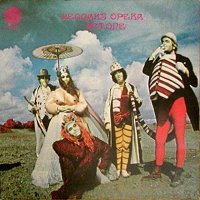 This was one of the many progressive rock bands on the legendary Vertigo-swirl label, and released a couple of fine albums. But I'm not sure if their debut "Act One" can be counted as one of them, as most songs on the album are marred by Alan Parker's very cheesy and circus-like organ-sound, and he was so little creative that almost every note he played was based on a classical theme. The only songs that stay clear of this are "Passacaglia" and the short but very nice "Memory". The opener "Poet and Peasant" and "Light Cavalry" are both basically both good, lengthy and complex progressive rock songs, but Parker do whatever he can too ruin them by his awful style of playing. And the absolutely worst moment on the album is undoubtedly the 11-minute jam "Raymond's Road" that is a collage of (badly played) classical themes, and the whole thing sounds like a very weak attempt at copying what The Nice did a year or two earlier. Martin Griffiths' excellent and powerful voice is mostly the only element of classic Beggar's Opera that was apparent on their first album. But their two next releases proved to be much better. This was one of the many progressive rock bands on the legendary Vertigo-swirl label, and released a couple of fine albums. But I'm not sure if their debut "Act One" can be counted as one of them, as most songs on the album are marred by Alan Parker's very cheesy and circus-like organ-sound, and he was so little creative that almost every note he played was based on a classical theme. The only songs that stay clear of this are "Passacaglia" and the short but very nice "Memory". The opener "Poet and Peasant" and "Light Cavalry" are both basically both good, lengthy and complex progressive rock songs, but Parker do whatever he can too ruin them by his awful style of playing. And the absolutely worst moment on the album is undoubtedly the 11-minute jam "Raymond's Road" that is a collage of (badly played) classical themes, and the whole thing sounds like a very weak attempt at copying what The Nice did a year or two earlier. Martin Griffiths' excellent and powerful voice is mostly the only element of classic Beggar's Opera that was apparent on their first album. But their two next releases proved to be much better.
Beggar's Opera - "Waters of Change" (Vertigo 1971)
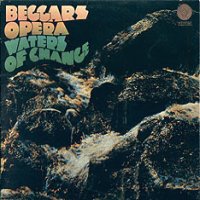 The band had now added a female mellotron-player named Virginia Wolf who also wrote some material for the group too. The rather cheesy sounding circus-organ of the first album had fortunately disappeared in favour of a more normal organ sound. The album is also better than the first one. "Time Machine" has a relaxed and dreamy feeling to it, while "I've No Idea" and the folky "Festival" were both more energetic and excellent progressive rock tracks. "The Fox" was probably the most complex song the group ever recorded. "Silver Peacock" has a very beautiful mellotron arrangement, and especially the intro sounds cool. There are also some short and very nice instrumentals between the longer tracks. The best of these is probably "Nimbus". An essential album from the early 70's progressive scene of England. The band had now added a female mellotron-player named Virginia Wolf who also wrote some material for the group too. The rather cheesy sounding circus-organ of the first album had fortunately disappeared in favour of a more normal organ sound. The album is also better than the first one. "Time Machine" has a relaxed and dreamy feeling to it, while "I've No Idea" and the folky "Festival" were both more energetic and excellent progressive rock tracks. "The Fox" was probably the most complex song the group ever recorded. "Silver Peacock" has a very beautiful mellotron arrangement, and especially the intro sounds cool. There are also some short and very nice instrumentals between the longer tracks. The best of these is probably "Nimbus". An essential album from the early 70's progressive scene of England.
Beggar's Opera - "Pathfinder" (Vertigo 1972)
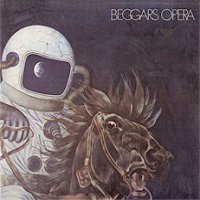 This album sounds a little more aggressive than the two previous albums. The mellotron was gone, and replaced by some harpsichord instead. The guitar is also more visible than before. The album includes what I would regard as BO's best recording ever: their version of Richard Harris' heavenly classic "Mac Arthur Park". The track seems to fit BO perfectly, and this version is still the best I've heard of it. Excellent harpsichord and organ lifts the track to the heights it deserves. This is simply one of my all time favourite tracks! But as I said, large parts of the album is heavier than anything the band had done before. "The Witch" and the harpsichord-driven "Madame Doubtfire" are both quite hard tracks with satanic lyrics! Both tracks are excellent anyway. "From Shark to Haggis" lives up to it's title. The first part is a sinister heavy progressive piece, while the last part is an instrumental with a very Scottish feel to it (after all, the band were from Scotland!). You should get both this and "Waters of Change". This album sounds a little more aggressive than the two previous albums. The mellotron was gone, and replaced by some harpsichord instead. The guitar is also more visible than before. The album includes what I would regard as BO's best recording ever: their version of Richard Harris' heavenly classic "Mac Arthur Park". The track seems to fit BO perfectly, and this version is still the best I've heard of it. Excellent harpsichord and organ lifts the track to the heights it deserves. This is simply one of my all time favourite tracks! But as I said, large parts of the album is heavier than anything the band had done before. "The Witch" and the harpsichord-driven "Madame Doubtfire" are both quite hard tracks with satanic lyrics! Both tracks are excellent anyway. "From Shark to Haggis" lives up to it's title. The first part is a sinister heavy progressive piece, while the last part is an instrumental with a very Scottish feel to it (after all, the band were from Scotland!). You should get both this and "Waters of Change".
Beggar's Opera - "Get Your Dog off Me!" (Vertigo 1973)
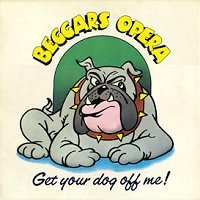 The band was joined by a new member on their fourth album. Peter Scott took over most of the vocals, and his folk-ish vocals made this album sound a lot different from the previous albums. But the music itself had changed too. Beggar's Opera had turned into a much more mainstream pop/rock band on this album, with the excellent instrumental "Classical Gas" as the only real progressive track here. Ricky Gardiner's distinctive and atmospheric playing style can still be heard on "Requiem" and "Turn Your Money Green". "Freestyle Ladies" and "Open Letters" are both decent tracks, but not progressive at all. The rest of the album is quite frankly boring and disappointing, and has no chance to stand up to the previous releases. And as I already have mentioned, the band had moved too far away from their progressive influences. But the band would unfortunately release even weaker albums... The band was joined by a new member on their fourth album. Peter Scott took over most of the vocals, and his folk-ish vocals made this album sound a lot different from the previous albums. But the music itself had changed too. Beggar's Opera had turned into a much more mainstream pop/rock band on this album, with the excellent instrumental "Classical Gas" as the only real progressive track here. Ricky Gardiner's distinctive and atmospheric playing style can still be heard on "Requiem" and "Turn Your Money Green". "Freestyle Ladies" and "Open Letters" are both decent tracks, but not progressive at all. The rest of the album is quite frankly boring and disappointing, and has no chance to stand up to the previous releases. And as I already have mentioned, the band had moved too far away from their progressive influences. But the band would unfortunately release even weaker albums...
Beggar's Opera - "Beggars can't be Choosers" (Jupiter 1979)
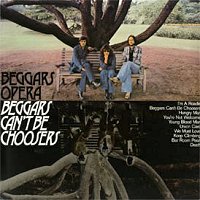 Beggar's Opera would never recover from the musical missteps of "Get Your Dog Off Me!". The band broke up after that album, only to reform shortly after with Gordon Sellar and Virgina Scott as the main members. They signed a deal with the German label Jupiter where they released a couple of albums. Jupiter didn't have any kind of distribution outside Germany, making it hard to find the records. So I guess it's then a positive thing that none of them were worth finding anyway! "Beggars can't be Choosers" was the last one of them, and explained all why. The album was full of useless and crappy pop-tunes like the title-track, "You're Not Welcome", "Young Blind Man" and "We Must Love". The attempts of making harder rock in "I'm a Roadie" and "Hungry Man" are just as dreadful and forgettable. The only track with anything remotely progressive about it was the 9-minute "Dead", although it's nothing more than a tedious folk-song with a psychedelic, instrumental synth-part at the end. This is a very weak and uninspired album of interest to collectors of the band only. Beggar's Opera would never recover from the musical missteps of "Get Your Dog Off Me!". The band broke up after that album, only to reform shortly after with Gordon Sellar and Virgina Scott as the main members. They signed a deal with the German label Jupiter where they released a couple of albums. Jupiter didn't have any kind of distribution outside Germany, making it hard to find the records. So I guess it's then a positive thing that none of them were worth finding anyway! "Beggars can't be Choosers" was the last one of them, and explained all why. The album was full of useless and crappy pop-tunes like the title-track, "You're Not Welcome", "Young Blind Man" and "We Must Love". The attempts of making harder rock in "I'm a Roadie" and "Hungry Man" are just as dreadful and forgettable. The only track with anything remotely progressive about it was the 9-minute "Dead", although it's nothing more than a tedious folk-song with a psychedelic, instrumental synth-part at the end. This is a very weak and uninspired album of interest to collectors of the band only.
Ben - "Ben" (Vertigo 1971)
 Ben's self-titled debut has the dubious honour of being widely rated as one of the weakest albums released on the Vertigo-swirl label. Although I can think of even more obvious candidates for that claim (especially Daddy Longlegs' utterly dreadful "Oakdown Farm" comes to mind), Ben's album had indeed serious flaws. But things sounds actually quite promising at first listen. Here are lengthy multi-part suites, excellent musicianship and an overall very appealing early 70's, very jazzy progressive rock sound with lots of flute, sax, keyboards and guitar. But closer inspection of the material on the album reveals that you've been cheated. All of the four tracks are made up of tiresome extended jams and solos that are built around themes and melodies that are all too simple and barely half-written at best. The closer "Gismo" demonstrates this problem best, and goes on for nearly 12 minutes without ever coming close to a good or memorable idea. "Gibbon" is probably the best track on the album, but even this one is also hampered by the same problems as the rest, although to a less extent. The opener "The Influence" is pointlessly divided into seven movements that all sounds the same, and "Christmas Execution" is made up of repetitive, unimaginative and uninspired riffs that goes nowhere. Too bad such good musicians with a sound like this would waste it all on such weak material as this album offers. Ben's self-titled debut has the dubious honour of being widely rated as one of the weakest albums released on the Vertigo-swirl label. Although I can think of even more obvious candidates for that claim (especially Daddy Longlegs' utterly dreadful "Oakdown Farm" comes to mind), Ben's album had indeed serious flaws. But things sounds actually quite promising at first listen. Here are lengthy multi-part suites, excellent musicianship and an overall very appealing early 70's, very jazzy progressive rock sound with lots of flute, sax, keyboards and guitar. But closer inspection of the material on the album reveals that you've been cheated. All of the four tracks are made up of tiresome extended jams and solos that are built around themes and melodies that are all too simple and barely half-written at best. The closer "Gismo" demonstrates this problem best, and goes on for nearly 12 minutes without ever coming close to a good or memorable idea. "Gibbon" is probably the best track on the album, but even this one is also hampered by the same problems as the rest, although to a less extent. The opener "The Influence" is pointlessly divided into seven movements that all sounds the same, and "Christmas Execution" is made up of repetitive, unimaginative and uninspired riffs that goes nowhere. Too bad such good musicians with a sound like this would waste it all on such weak material as this album offers.
Biglietto Per L'Inferno - "Biglietto Per L'Inferno" (Trident 1973)
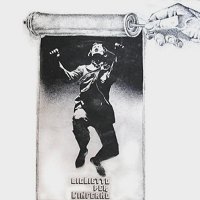 Despite its lousy sound-quality, Biglietto Per L'Inferno's self-titled debut is an obscure gem in the genre of 70's heavy progressive rock. The music perfectly combined hard rock with the complex structures and intricate arrangements of progressive rock. The band had two keyboard-players (one of them was Baffo Banfi). None of them used mellotron, but the sounds they used were so varied, tasteful, perfectly 70's that you won't miss the mellotron at all. Just check out the opening track "Ansia", and you'll hear. Hard rocking guitar and flute builds up to a keyboard theme played by a very powerful and fat moog-sound. The second track "Confessione" is something as unusual as a boogie-driven hard rock track with complex and progressive instrumental sections where the whole band showed impressive skills. "Una Strana Regina" was a more typical heavy-progressive track where Jethro Tull-ish flute blends in with the riffs, and you also get some atmospheric keyboard-passages. "Il Nevare" is maybe a bit repetitive and too simple, but it's all forgiven when it glides into the masterful 14-minute "L'Amico Suicida". This is a very complex piece that demonstrates almost every side of Italian 70's progressive rock. Great stuff. The album was ended with a somewhat unnecessary instrumental-version of "Confessione", but it still doesn't ruin the overall good impression of the album. Despite its lousy sound-quality, Biglietto Per L'Inferno's self-titled debut is an obscure gem in the genre of 70's heavy progressive rock. The music perfectly combined hard rock with the complex structures and intricate arrangements of progressive rock. The band had two keyboard-players (one of them was Baffo Banfi). None of them used mellotron, but the sounds they used were so varied, tasteful, perfectly 70's that you won't miss the mellotron at all. Just check out the opening track "Ansia", and you'll hear. Hard rocking guitar and flute builds up to a keyboard theme played by a very powerful and fat moog-sound. The second track "Confessione" is something as unusual as a boogie-driven hard rock track with complex and progressive instrumental sections where the whole band showed impressive skills. "Una Strana Regina" was a more typical heavy-progressive track where Jethro Tull-ish flute blends in with the riffs, and you also get some atmospheric keyboard-passages. "Il Nevare" is maybe a bit repetitive and too simple, but it's all forgiven when it glides into the masterful 14-minute "L'Amico Suicida". This is a very complex piece that demonstrates almost every side of Italian 70's progressive rock. Great stuff. The album was ended with a somewhat unnecessary instrumental-version of "Confessione", but it still doesn't ruin the overall good impression of the album.
Birth Control - "Plastic People" (CBS 1975)
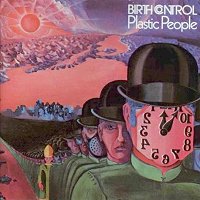 Birth Control started up as a kind of a German answer to Deep Purple, but their sound evolved into complex and high-class progressive rock in the mid 70's. Their progressive period would unfortunately last for only two albums, but these albums features some of the strongest and most competent progressive rock recorded by a German group. "Plastic People" was the first of their two progressive efforts and includes some truly excellent, distinctive and varied progressive rock. The sound is complex and all the musicians are very involved in it. Keyboard-player Zeus B. Held used all the most progressive and best keyboards you can imagine: Hammond-organ, moog, el-piano, Mellotron and some typical German-sounding synths here and there. Bruno Frenzel (R.I.P.) contributed with some great guitar-work (especially emotional on the end of "Trial Trip"). The vocals on most of the album are shared between drummer Bernd Noske and bass-player Peter Föller. The latter has an almost Robert Wyatt-like touch to his vocals. The album opens with the superb title-track, full of breath-taking instrumental parts and some wonderful and relaxed vocal-parts and an overall delightful 70's atmosphere and sound to it all. "Tiny Flashlight" is much in the same vein and sound, but now with a very symphonic and almost eastern-influenced part in the middle. The incredible complex "My Mind" sounds somewhat Gentle Giant-influenced without sounding like GG at all. Side 2 sounds a bit rockier and reveals more of their hard-rock roots, but still with a great degree of complexity and excellent, progressive arrangements. "Rockin' Rollin' Roller" is based in a rather simple theme, but it's built around lots of unexpected twist and turns with cool Moog-work from Held. "Trial Trip" starts as a riff-based hard-rocker, but turns in the second part into a beautiful and symphonic part with Frenzel's guitar-work driven forward by the Mellotron. The closing number "This Song is Just for You" is a little bit slicker with a slight soul-influence, horns and flute. This track is probably an acquired taste for some of you, but the 70's sound and atmosphere is undeniable delightful on this track as on the whole rest of the album. "Plastic People" was one of the very best progressive rock albums released in 1975. Birth Control started up as a kind of a German answer to Deep Purple, but their sound evolved into complex and high-class progressive rock in the mid 70's. Their progressive period would unfortunately last for only two albums, but these albums features some of the strongest and most competent progressive rock recorded by a German group. "Plastic People" was the first of their two progressive efforts and includes some truly excellent, distinctive and varied progressive rock. The sound is complex and all the musicians are very involved in it. Keyboard-player Zeus B. Held used all the most progressive and best keyboards you can imagine: Hammond-organ, moog, el-piano, Mellotron and some typical German-sounding synths here and there. Bruno Frenzel (R.I.P.) contributed with some great guitar-work (especially emotional on the end of "Trial Trip"). The vocals on most of the album are shared between drummer Bernd Noske and bass-player Peter Föller. The latter has an almost Robert Wyatt-like touch to his vocals. The album opens with the superb title-track, full of breath-taking instrumental parts and some wonderful and relaxed vocal-parts and an overall delightful 70's atmosphere and sound to it all. "Tiny Flashlight" is much in the same vein and sound, but now with a very symphonic and almost eastern-influenced part in the middle. The incredible complex "My Mind" sounds somewhat Gentle Giant-influenced without sounding like GG at all. Side 2 sounds a bit rockier and reveals more of their hard-rock roots, but still with a great degree of complexity and excellent, progressive arrangements. "Rockin' Rollin' Roller" is based in a rather simple theme, but it's built around lots of unexpected twist and turns with cool Moog-work from Held. "Trial Trip" starts as a riff-based hard-rocker, but turns in the second part into a beautiful and symphonic part with Frenzel's guitar-work driven forward by the Mellotron. The closing number "This Song is Just for You" is a little bit slicker with a slight soul-influence, horns and flute. This track is probably an acquired taste for some of you, but the 70's sound and atmosphere is undeniable delightful on this track as on the whole rest of the album. "Plastic People" was one of the very best progressive rock albums released in 1975.
Label
Birth Control - "Backdoor Possibilities" (Brain 1976)
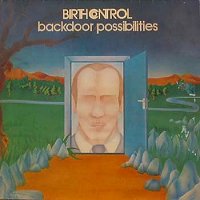 Birth Control's second progressive album could equal even Gentle Giant when it comes to complexity and weird time-changes, and it's pretty obvious that Gentle Giant were a great inspiration for this album. Zeus B. Held is heavy on the Moog and string-synth here, and he comes up with loads of cool, varied and unusual sounds. Three of the six tracks are divided into several parts, so you can be sure that you won't get any straightforward stuff. And all of the tracks are absolutely outstanding complex mid-70's progressive rock and I would dare to say that if Birth Control had stuck to the sound and style of "Plastic People" and this album, then they would have been remembered as one of the greatest progressive rock bands from Germany. My personal favourites on the album include the opener "One First of April" and the closing number "No Time to Dye". Both these tracks are very similar to "Plastic People" and the latter also mixes a very Yes-like chorus in at the end. "Beedeepees" is probably the most Gentle Giant-sounding track they ever recorded, both in sound and structure. "Futile Prayer" is a melodramatic ballad where drummer Noske's vocal unfortunately is a bit more accented than on the other tracks, but the song is still great. The melodic and powerful "Behind Grey Walls" have a strong Genesis-influence while the instrumental "La Cigüena de Zaragoza" is jazzier with a cool sax-part at the end. The lyrics on the album tell the story of a businessman and his journey beyond in a subway train. The story is not very interesting and engaging, mostly because it has no meaning at all. But no one can deny the quality of the music itself, and both this and "Plastic People" are obligatory purchases from the German 70's progressive rock scene. Birth Control's second progressive album could equal even Gentle Giant when it comes to complexity and weird time-changes, and it's pretty obvious that Gentle Giant were a great inspiration for this album. Zeus B. Held is heavy on the Moog and string-synth here, and he comes up with loads of cool, varied and unusual sounds. Three of the six tracks are divided into several parts, so you can be sure that you won't get any straightforward stuff. And all of the tracks are absolutely outstanding complex mid-70's progressive rock and I would dare to say that if Birth Control had stuck to the sound and style of "Plastic People" and this album, then they would have been remembered as one of the greatest progressive rock bands from Germany. My personal favourites on the album include the opener "One First of April" and the closing number "No Time to Dye". Both these tracks are very similar to "Plastic People" and the latter also mixes a very Yes-like chorus in at the end. "Beedeepees" is probably the most Gentle Giant-sounding track they ever recorded, both in sound and structure. "Futile Prayer" is a melodramatic ballad where drummer Noske's vocal unfortunately is a bit more accented than on the other tracks, but the song is still great. The melodic and powerful "Behind Grey Walls" have a strong Genesis-influence while the instrumental "La Cigüena de Zaragoza" is jazzier with a cool sax-part at the end. The lyrics on the album tell the story of a businessman and his journey beyond in a subway train. The story is not very interesting and engaging, mostly because it has no meaning at all. But no one can deny the quality of the music itself, and both this and "Plastic People" are obligatory purchases from the German 70's progressive rock scene.
Black Widow - "Sacrifice" (CBS 1970)
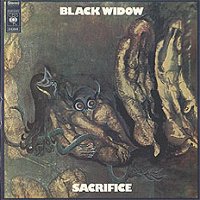 This British band released an album under the name Pesky Gee before they decided to change name to the more sinister Black Widow. They knew exactly that they were not the greatest musicians or songwriters on earth, so they adopted a very accomplished satanic image that went further than any other band before them. Their stage-show included sacrificing of virgins, giving the band some attention that they never would have got if they just had relied on their music. "Sacrifice" was undoubtedly their best album, as all the occult and satanic imagery at least managed to hide some of the band's most obvious shortcomings. Their music was progressive rock with lots of flute, sax and organ performed in a charmingly mediocre way. The album also featured some strings on "Conjuration", "Seduction" (a love song to a demon) and "Come to the Sabbath". The latter one was catchy enough to be a minor hit and the band's signature tune. The lyrics was the most apparently satanic stuff any band had written until then. And they also went the opposite way of Black Sabbath's lyrics. While Sabbath's lyrics were dark, sinister, frightening and could almost be seen as a warning against Satanism, Black Widow was with their almost cheerful and fairy-tale styled music making it look romantic and exciting. "Sacrifice" is at its best an amusing album with a nice, early 70's atmosphere and is the only Black Widow-release worth having. This British band released an album under the name Pesky Gee before they decided to change name to the more sinister Black Widow. They knew exactly that they were not the greatest musicians or songwriters on earth, so they adopted a very accomplished satanic image that went further than any other band before them. Their stage-show included sacrificing of virgins, giving the band some attention that they never would have got if they just had relied on their music. "Sacrifice" was undoubtedly their best album, as all the occult and satanic imagery at least managed to hide some of the band's most obvious shortcomings. Their music was progressive rock with lots of flute, sax and organ performed in a charmingly mediocre way. The album also featured some strings on "Conjuration", "Seduction" (a love song to a demon) and "Come to the Sabbath". The latter one was catchy enough to be a minor hit and the band's signature tune. The lyrics was the most apparently satanic stuff any band had written until then. And they also went the opposite way of Black Sabbath's lyrics. While Sabbath's lyrics were dark, sinister, frightening and could almost be seen as a warning against Satanism, Black Widow was with their almost cheerful and fairy-tale styled music making it look romantic and exciting. "Sacrifice" is at its best an amusing album with a nice, early 70's atmosphere and is the only Black Widow-release worth having.
Black Widow - "Black Widow" (CBS 1970)
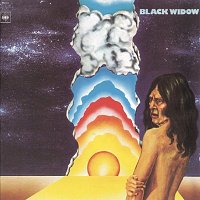 Black Widow was obviously trying to get "serious" on their self-titled second album, as all the Satanism was gone and they decided instead to let just the music carry them. But without their image, the only valuable thing of the band disappeared: the entertainment. The album was an attempt at making a varied and diverse progressive rock album, but it all falls flat on its face due to the band's lack of both songwriting skills and instrumental abilities. To be honest, the simplistic sax-prog of "Tears and Wine", the light-hearted pop of "When My Mind Was Young", the dramatic "Mary Clarke" and the hard rock of "Wait Until Tomorrow" is not directly painful listening, but they're all still very mediocre songs when you compare them with the really GOOD bands around the same time. And the band's clumsy performance didn't make things much better. The worst and most embarrassing moment on the album is probably their attempt at making raw blues in "Poser". This is a weak album from a weak band, and of interest to no others than 70's progressive rock completists. Black Widow was obviously trying to get "serious" on their self-titled second album, as all the Satanism was gone and they decided instead to let just the music carry them. But without their image, the only valuable thing of the band disappeared: the entertainment. The album was an attempt at making a varied and diverse progressive rock album, but it all falls flat on its face due to the band's lack of both songwriting skills and instrumental abilities. To be honest, the simplistic sax-prog of "Tears and Wine", the light-hearted pop of "When My Mind Was Young", the dramatic "Mary Clarke" and the hard rock of "Wait Until Tomorrow" is not directly painful listening, but they're all still very mediocre songs when you compare them with the really GOOD bands around the same time. And the band's clumsy performance didn't make things much better. The worst and most embarrassing moment on the album is probably their attempt at making raw blues in "Poser". This is a weak album from a weak band, and of interest to no others than 70's progressive rock completists.
Black Widow - "III" (CBS 1971)
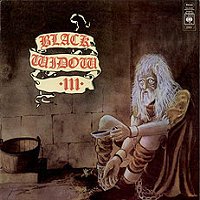 The band was joined by former Cressida-guitarist John Culley on their third and final album. You could may expect that this would result in a slightly better product than the previous album, but "Black Widow III" sounds in my ears even more amateurish and mediocre than anything they had done before. "The Battle" is a 10-minute three-part suite that opens the album. It has actually one decent riff in it, but the rest of the track lacks everything that sounds remotely like good melodies and memorable themes. And Kip Trevor reveals himself as an awful singer. The only track that I really care for is "The Sun". It's a short and very nice little tune with a lovely atmosphere. The rest is a study in mediocrity, and the bottom is reached in "Old Man" where the band attempts to sound folk-influenced. If you want an amusing slice of satanic early 70's prog, then get "Sacrifice" and skip the two other albums. The band was joined by former Cressida-guitarist John Culley on their third and final album. You could may expect that this would result in a slightly better product than the previous album, but "Black Widow III" sounds in my ears even more amateurish and mediocre than anything they had done before. "The Battle" is a 10-minute three-part suite that opens the album. It has actually one decent riff in it, but the rest of the track lacks everything that sounds remotely like good melodies and memorable themes. And Kip Trevor reveals himself as an awful singer. The only track that I really care for is "The Sun". It's a short and very nice little tune with a lovely atmosphere. The rest is a study in mediocrity, and the bottom is reached in "Old Man" where the band attempts to sound folk-influenced. If you want an amusing slice of satanic early 70's prog, then get "Sacrifice" and skip the two other albums.
Blocco Mentale - "Poa" (Titania 1973)
 Another album and band from the almost endless stream of competent Italian progressive rock from the 70's. The style of this band is quite typical Italian, with some influences from bands as PFM mixed with some Gentle Giant styled saxophone here and there. Very melodic and pleasant, but it may not be the most original if you're already familiar with a lot of Italian bands. But it's definitively good. The opening track "Capita" is my personal favourite on the album. A wonderful track with a perfect arrangement consisting of flute, piano, saxophone, acoustic guitar and organ. The beautiful "Impressioni" and the very vocal-oriented "La Nuova Forza" are other excellent tracks. You'll surely like this album if you like Italian progressive. Another album and band from the almost endless stream of competent Italian progressive rock from the 70's. The style of this band is quite typical Italian, with some influences from bands as PFM mixed with some Gentle Giant styled saxophone here and there. Very melodic and pleasant, but it may not be the most original if you're already familiar with a lot of Italian bands. But it's definitively good. The opening track "Capita" is my personal favourite on the album. A wonderful track with a perfect arrangement consisting of flute, piano, saxophone, acoustic guitar and organ. The beautiful "Impressioni" and the very vocal-oriented "La Nuova Forza" are other excellent tracks. You'll surely like this album if you like Italian progressive.
Blåkulla - "Blåkulla" (Anette 1975)
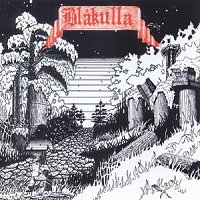 Blåkulla was a Swedish symphonic progressive rock band that was active during the mid-70's. Their one and only album was released in 1975, and it's a listenable but far from fantastic work. Their main influence was obviously Yes, but not more than they were not a clone-band. Swirling organ and guitar are the most dominant instruments in their sound. The guitar-playing varies from harmonic, melodic, almost Jan Akkerman- like and to more gutsy and aggressive. There's also some Squire-like bass here and there, and it can be heard especially good on the short instrumental "De Må Få La Stå Öppe Tess Vidare". The songwriting is decent, and there's no track here that is painful to listen to. "Sirenernas Sång", "Idealet", "Maskinsång" and the lengthy closing-track "Erindran" will suite most 70's progressive rock fans. In between these tracks are also some short and atmospheric acoustic pieces. They also do a cover of "Drottningholms Musiken", which is a Swedish classical piece. But the muddled production weakens the overall impression, and the vocals are a bit weak from time to time. Blåkulla was a Swedish symphonic progressive rock band that was active during the mid-70's. Their one and only album was released in 1975, and it's a listenable but far from fantastic work. Their main influence was obviously Yes, but not more than they were not a clone-band. Swirling organ and guitar are the most dominant instruments in their sound. The guitar-playing varies from harmonic, melodic, almost Jan Akkerman- like and to more gutsy and aggressive. There's also some Squire-like bass here and there, and it can be heard especially good on the short instrumental "De Må Få La Stå Öppe Tess Vidare". The songwriting is decent, and there's no track here that is painful to listen to. "Sirenernas Sång", "Idealet", "Maskinsång" and the lengthy closing-track "Erindran" will suite most 70's progressive rock fans. In between these tracks are also some short and atmospheric acoustic pieces. They also do a cover of "Drottningholms Musiken", which is a Swedish classical piece. But the muddled production weakens the overall impression, and the vocals are a bit weak from time to time.
Brainchild - "Healing of the Lunatic Owl" (A&M 1970)
 Lennie Wright from Web and Samurai produced Brainchild's first and only album, so it's no surprise that "Healing of the Lunatic Owl" is in a similar style to both "I Spider" and Samurai's self-titled album. That means early 70's progressive rock dominated by horns and organ. The opener "Autobiography" starts as a straightforward rocker, but turns in the middle into a complex instrumental section that lasts for the rest of the song. Although it's one of the shortest tracks on the album, it sums up nearly every side of the band's music very well. The swinging title-track is one of the highlights, and the structure is really not that far away from "Autobiography", but the track returns to the main part at the end again. The slow and bluesy beat of "Hide From the Dawn" is a bit more basic, but the long instrumental passages and complex arrangements make it well worth listening to. "She's Learning" is the catchiest song on the album, and has almost hit-potential. However, the longest tune is "A Time A Place", featuring dramatic vocal parts mixed with more intricate instrumental parts. "Two Bad Days" is for me the least good song, but the ballad "Sadness of a Moment" is really beautiful, consisting of nothing else than flute, guitar and vocals. And the album finally closes with the excellent instrumental "To "B"". I'm not sure if I would rate this album as high as "I Spider" or "Samurai", but it's still a very good LP worth finding if you enjoy the two mentioned bands or progressive rock with horns in general. Lennie Wright from Web and Samurai produced Brainchild's first and only album, so it's no surprise that "Healing of the Lunatic Owl" is in a similar style to both "I Spider" and Samurai's self-titled album. That means early 70's progressive rock dominated by horns and organ. The opener "Autobiography" starts as a straightforward rocker, but turns in the middle into a complex instrumental section that lasts for the rest of the song. Although it's one of the shortest tracks on the album, it sums up nearly every side of the band's music very well. The swinging title-track is one of the highlights, and the structure is really not that far away from "Autobiography", but the track returns to the main part at the end again. The slow and bluesy beat of "Hide From the Dawn" is a bit more basic, but the long instrumental passages and complex arrangements make it well worth listening to. "She's Learning" is the catchiest song on the album, and has almost hit-potential. However, the longest tune is "A Time A Place", featuring dramatic vocal parts mixed with more intricate instrumental parts. "Two Bad Days" is for me the least good song, but the ballad "Sadness of a Moment" is really beautiful, consisting of nothing else than flute, guitar and vocals. And the album finally closes with the excellent instrumental "To "B"". I'm not sure if I would rate this album as high as "I Spider" or "Samurai", but it's still a very good LP worth finding if you enjoy the two mentioned bands or progressive rock with horns in general.
Label
Bram Stoker - "Heavy Rock Spectacular" (Windmill 1972)
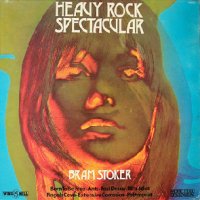 Not much is known about this British band, apart from the fact that they released their first and only album "Heavy Rock Spectacular" in 1972. The music is very typical early 70's progressive rock with lots of classical influenced organ and some heavy guitar. Originality is not one of the main strengths of this album, but the overall consistent and solid songs make up for it. Keyboardist T. Bronsdon wrote all the tracks, and they vary from complex instrumentals to gloomy vocal-tracks that often dealt with occult and mystical subjects, such as the atmospheric "Poltergeist". "Ants" and "Fast Decay" are both good instrumental-numbers where Bronsdon borrows quite a lot from Bach on the latter one. "Fingal's Cave" reminds me of Julian's Treatment, and is the longest track on the album. "Idiot" combines catchy vocal-melodies with Emerson-like organ, while "Blitz" offers some really nice early 70's atmosphere. "Born to be Free" is a quite weird choice as the opener for the album, as this straightforward hard rock is not very representative for the rest of the record. The song is quite good, though. Not much is known about this British band, apart from the fact that they released their first and only album "Heavy Rock Spectacular" in 1972. The music is very typical early 70's progressive rock with lots of classical influenced organ and some heavy guitar. Originality is not one of the main strengths of this album, but the overall consistent and solid songs make up for it. Keyboardist T. Bronsdon wrote all the tracks, and they vary from complex instrumentals to gloomy vocal-tracks that often dealt with occult and mystical subjects, such as the atmospheric "Poltergeist". "Ants" and "Fast Decay" are both good instrumental-numbers where Bronsdon borrows quite a lot from Bach on the latter one. "Fingal's Cave" reminds me of Julian's Treatment, and is the longest track on the album. "Idiot" combines catchy vocal-melodies with Emerson-like organ, while "Blitz" offers some really nice early 70's atmosphere. "Born to be Free" is a quite weird choice as the opener for the album, as this straightforward hard rock is not very representative for the rest of the record. The song is quite good, though.
Bubu - "Anabelas" (EMI 1978)
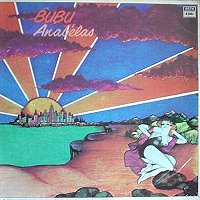 One of the best known and most regarded South American progressive rock releases came with the album "Anabelas" from the Argentinean band Bubu. They were a large group, featuring no less than eight members, including a composer and arranger who apparently didn't play any instrument on the record. They also didn't use any keyboards, although a guest on piano is featured. Their main influence is clearly King Crimson, but I can also hear elements reminding of Osanna. The choir and somewhat chaotic and menacing jazzy-passages that occasionally appear throughout the music can also give some slight associations to Magma. "Anabelas" consisted of three lengthy tracks, where the instrumental "El Cortejo de un Dia Amarillo" was the sidelong one. It opens very chaotic and noisy before stabilizing into a steady beat where saxophone and flute play some quite dark and sinister themes simultaneously. There's an ominous and tense feel here that is further strengthened when the guitar joins in and the pace fastens. The violin usually plays a key role in the more harmonic passages, playing melodies of a more peaceful kind, although it surely also could let loose in some fast solos. Some parts also go into experimental avant-garde territory, but fortunately not for very long. The choir appears quite efficiently in the middle where it joins in for singing some melodies along with the playing of the band. Its best appearance is however after the piece has slowed down and starts to build up again towards the end. The two tracks on the other side are in the same style, although with lyrics and Spanish vocals. The start of "El Viaje de Anabelas" alternates between the choir and band with a theme that the band repeats right afterward without the choir. The vocals naturally give the music a stronger South American touch here. But it's definitively the instrumental sections where the band shines most, and the ones here are probably the most complex on the album. The flute, saxophone and violin are still the main instruments, but the various and ever changing time-signatures and the choir are also important elements to the complete style of Bubu. The track then goes into something close to a symphonic march that builds up to a much more straightforward rocking part, but without loosing connection to the rest of the track or sound. And speaking of rocking, the closer "Sueños de Maniquí" rocks hard and intense most of the way, but in sort of an avant-garde way. "Anabelas" will be well worth a try if you like your progressive rock dark, complex and dynamic. And thanks to Erlend for nagging so much about this album that I finally bothered to check it out. One of the best known and most regarded South American progressive rock releases came with the album "Anabelas" from the Argentinean band Bubu. They were a large group, featuring no less than eight members, including a composer and arranger who apparently didn't play any instrument on the record. They also didn't use any keyboards, although a guest on piano is featured. Their main influence is clearly King Crimson, but I can also hear elements reminding of Osanna. The choir and somewhat chaotic and menacing jazzy-passages that occasionally appear throughout the music can also give some slight associations to Magma. "Anabelas" consisted of three lengthy tracks, where the instrumental "El Cortejo de un Dia Amarillo" was the sidelong one. It opens very chaotic and noisy before stabilizing into a steady beat where saxophone and flute play some quite dark and sinister themes simultaneously. There's an ominous and tense feel here that is further strengthened when the guitar joins in and the pace fastens. The violin usually plays a key role in the more harmonic passages, playing melodies of a more peaceful kind, although it surely also could let loose in some fast solos. Some parts also go into experimental avant-garde territory, but fortunately not for very long. The choir appears quite efficiently in the middle where it joins in for singing some melodies along with the playing of the band. Its best appearance is however after the piece has slowed down and starts to build up again towards the end. The two tracks on the other side are in the same style, although with lyrics and Spanish vocals. The start of "El Viaje de Anabelas" alternates between the choir and band with a theme that the band repeats right afterward without the choir. The vocals naturally give the music a stronger South American touch here. But it's definitively the instrumental sections where the band shines most, and the ones here are probably the most complex on the album. The flute, saxophone and violin are still the main instruments, but the various and ever changing time-signatures and the choir are also important elements to the complete style of Bubu. The track then goes into something close to a symphonic march that builds up to a much more straightforward rocking part, but without loosing connection to the rest of the track or sound. And speaking of rocking, the closer "Sueños de Maniquí" rocks hard and intense most of the way, but in sort of an avant-garde way. "Anabelas" will be well worth a try if you like your progressive rock dark, complex and dynamic. And thanks to Erlend for nagging so much about this album that I finally bothered to check it out.

|